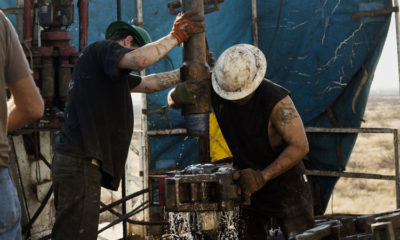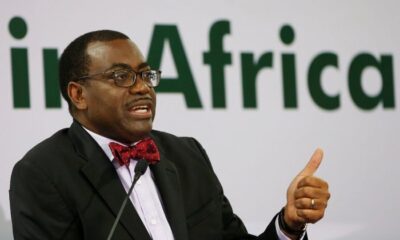Finance
Minister: Fed Govt Targets $22b Foreign Investments in Two Years
Published
6 years agoon

- Minister: Fed Govt Targets $22b Foreign Investments in Two Years
The Federal Government will attract $22 billion private sector investments through the Economic Recovery and Growth Plan (ERGP) “Focused Laboratories” in two years, Budget and National Planning Minister Senator Udoma Udo Udoma said yesterday.
Nigerians, he said, may have to wait for that period before reaping the fruit of foreign investments.
The government, through the ERGP, the minister said, planned to create about 15 million jobs by 2020.
“We intend to achieve this principally through stimulating the private sector.
“Our aim is to make Nigeria a more investment-friendly place, a more attractive place for people to do business.
“We have conducted sector specific labs, which we referred to as the ERGP Focus Labs, to bring potential investors and government officials together to seek to remove the bottlenecks and impediments impeding investment projects.
“We identified over $22 billion of potential investments which could be unlocked, if we can remove some of these impediments,” he said.
Udoma said in Nigeria, the government was forced to cut down its growth projections for this year from three per cent to 2.1 per cent due to oil production challenges in the second quarter of the year.
The minister spoke in Bali, Indonesia, at the launch of the Sub Sahara Africa Regional Economic Outlook.
He said it would take at least two years for the full manifestation of the investment potential of the EPRG of the Federal Government.
“I think it will take one or two years before they actually come to fruition.
“However, government has set up a crack team of four experts who were recruited to work with stakeholders in the private sector on ways to actually have the expected investors come in under the economic plan”, the minister said.
He said the flooding in some states affected the agriculture sector as did the herdsmen clashes in certain areas.
On foreign investments, Udoma agreed with the advice of the International Monetary Fund (IMF) that Nigeria must put in place sound macro-economic policy to mitigate risks associated with volatile capital flows.
Director of the IMF’s African Department Mr Abebe Selassie, while presenting the regional outlook, said Sub-Saharan Africa’s economic recovery was expected to continue growing.
He said growth was projected to increase from 2.7 per cent in 2017 to 3.1 per cent in 2018 and 3.8 percent in 2019.
“Growth is set to improve most notably for oil exporters, while non-resource intensive countries continue to grow strongly, with quite a few growing at six per cent or more.”
“While there has been progress in narrowing fiscal deficits, more focus is needed to raise revenues to support continued development spending and to service debt,” he said.
According to the 2018 Sub-Sahara Africa Regional Economic Outlook, to grow, the region must create at least 20 million jobs per year to absorb new entrants into the labor market.
The IMF in the report advised the region to take policy actions to encourage deepening of trade and financial integration, in the context of the African Continental Free Trade.
It also advised the region to remove market distortions, improve the efficiency of public spending, promoting digital connectivity and a flexible education system and fostering an environment that is conducive to private investment and risk taking.
The World Bank Group (WBG) also yesterday urged Nigeria to invest massively in human capital development as a matter of priority or risk having a jobless work force in about 20 years.
Its President, Dr. Jim Yong Kim, who gave the advice at a briefing at the ongoing 2018 Annual Meetings of the IMF/WBG in Bali described Nigeria is one of the most important countries in Africa and in the world, “so we feel that it will be extremely important for Nigeria to really go on a different level all together in terms of their commitment to investing in human capital.
He said it was important that development actions were guided by data, saying that “Nigeria unfortunately ranks 152 out of 157 countries. He said the World Bank has been quite supportive in providing aid to the country in the health sector, “but we feel that the overall spending in health (about .076 of GDP) is just far too low. The educational outcomes in Nigeria are very, very low,” he added.
The World Bank chief who was responding to a question on what programme the bank has for Nigeria on human capital development, admitted nonetheless that the bank has its own share of the blames for the woes, not only in Nigeria, but the African sub-continent.
He said: Many African countries are in the red zone. I think the World Bank has to take some responsibility for having emphasised hard infrastructure – roads, rails, energy, for a very long time,” stating that the bank has begun to reverse that scenario in the last 20 years. But he said for most African countries, the thinking remains that “we’ll invest in hard infrastructure and then when we grow rich, we’ll have enough money to invest in health and education.”
But that’s the wrong approach, Kim said.
“We’re now saying that’s the wrong approach, you’ve got to start investing in your people right now.” Pointing out that if this option was ignored, it will spell doom for the affected countries because of the ” rapid change in technology and the fact that many low-income jobs will be eliminated.”
He said the bank cannot put a finger on exactly when this prediction will evolve, but said 20years from now look somewhat the time frame.
”Nobody is quite sure how long that will take, but a child born today, in 20years almost certainly, many of the low-skill jobs today will be gone. Ant the requirement for this child to be able to learn throughout his, or her entire life is simply going to get higher. The requirement, the needs are going to get higher and higher,” he stated.
Kim said the World Bank is ready to lend its support to African countries that are ready to take on the gauntlet, saying funding for growing the skills and human capital development, are not only ready, but enlarged.
As he put it: “This is a very loud and strong message to Africa. Africa needs to invest more in health and education,” saying, “our Fund for the poorest countries is 50 per cent larger than it was three years ago because we have financing, we can provide more support for African countries.”
For the bank’s input to achieve the intended results, Kim urged the respective governments to take responsibility for the success of the programme.
He said: “But the message here is that Heads of State and Ministers of finance have to take responsibility,” saying that the long age practice of waiting for grants before action was taken in developing human capital should be done away with and called on Nigeria to answer this call.
“So we hope that this is a loud wake-up-call for leaders throughout the Africa continent, and especially in Nigeria,” he stressed.
Is the CEO and Founder of Investors King Limited. He is a seasoned foreign exchange research analyst and a published author on Yahoo Finance, Business Insider, Nasdaq, Entrepreneur.com, Investorplace, and other prominent platforms. With over two decades of experience in global financial markets, Olukoya is well-recognized in the industry.

You may like
-
70 Million Poorest of The Poor Nigerians To Get N75,000 From FG
-
Nigeria Surpasses OPEC Quota with 1.51 Million bpd, Targets 2.06 Million in 2025
-
Global Investors Commit $7.6 Billion to Nigeria’s Development at AIF 2024
-
Nigeria-China Trade Strengthened as Grimaldi Introduces Direct Shipping Line
-
Nigeria’s GDP Records 3.46% Growth in Q3 Spurred by Non-Oil Sector
-
President Tinubu Presents N47.9trn 2025 Budget As Debt Servicing, Security, Infrastructure Take Lion Shares













